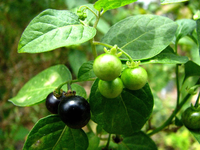It's spring planting season and as I was out preparing my garden soil I found it full of a nasty plant-- a weed, called American Black Nightshade.
Now I know I didn't plant any of this, but there it is-- in my garden. Last year, as my garden was growing and maturing-- there was a bunch of growth that I didn't recognize and couldn't identify or remember having planted. I suspected they were some kind of week, but since they had little berries I waited for a time to see what these might be.
My son's girlfriend visited and she had this app on her phone that allowed her to take a pic of the plants and berries and it immediately identified them for us-
Solanum americanum, commonly known as American black nightshade.

Now I know I didn't plant any of this, but there it is-- in my garden. Last year, as my garden was growing and maturing-- there was a bunch of growth that I didn't recognize and couldn't identify or remember having planted. I suspected they were some kind of week, but since they had little berries I waited for a time to see what these might be.
My son's girlfriend visited and she had this app on her phone that allowed her to take a pic of the plants and berries and it immediately identified them for us-
Solanum americanum, commonly known as American black nightshade.


